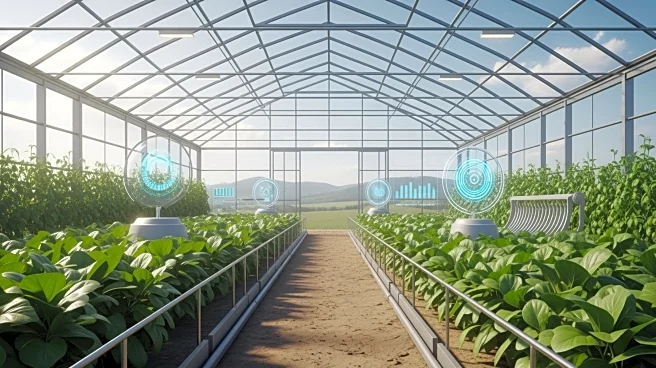What's Happening?
Farmonaut is advancing organic farming practices by integrating technology to address environmental challenges and promote sustainable agriculture. The company emphasizes the use of natural inputs and ecological processes, such as compost, green manure,
crop rotation, and biofertilizers, to enhance soil health and biodiversity. Farmonaut's platform utilizes satellite imagery, AI, and blockchain to provide real-time farm monitoring, AI-based advisory, and product traceability. These tools help farmers optimize resource use, monitor pest and disease outbreaks, and access markets efficiently. The adoption of organic farming is seen as essential for building resilient agricultural systems capable of feeding a growing population while conserving soil, water, and biodiversity.
Why It's Important?
The shift towards organic farming is crucial in mitigating climate change impacts and ensuring long-term sustainability of food systems. By avoiding synthetic inputs, organic farming reduces pollution and promotes carbon sequestration and water conservation. It supports local farmers, fair trade, and rural community development, enhancing social equity. The economic viability of organic methods is highlighted by lower input costs and access to premium markets. As organic systems build healthy soils and increase biodiversity, they become more resilient to climate extremes, such as droughts and floods. This transition is vital for preserving ecological integrity and ensuring food security in the face of environmental challenges.
What's Next?
Farmonaut's continued innovation in organic farming practices is expected to drive widespread adoption and scalability. The integration of precision agriculture tools, real-time satellite monitoring, and digital platforms will enable farmers to optimize resource use and improve efficiency. As technology meets tradition, organic farming is poised to deliver significant positive impacts on the environment, food systems, and communities. The future outlook for organic farming is promising, with increasing policy support, technological advancements, and growing consumer demand for sustainable, traceable food. These trends position organic agriculture as a foundation for a greener and healthier world.
Beyond the Headlines
The ethical and cultural dimensions of organic farming are significant, as it promotes environmental stewardship and supports local communities. The transition to organic farming involves overcoming challenges such as yield gaps, certification hurdles, and labor intensity. However, these can be addressed through science-based policies, investment in research and technology, and farmer education. The role of digital platforms in connecting organic farmers to consumers and ensuring transparency in supply chains is crucial. As organic farming gains momentum, it represents a shift towards more sustainable and equitable food systems.















